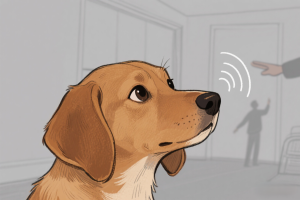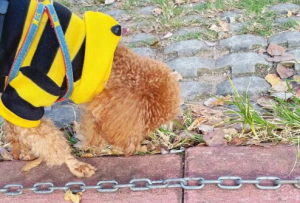-
Muzzle “Sealing” Method
If a dog bites, barks excessively, or eats things it shouldn’t, you can put a muzzle on it when going out to help correct those behaviors. However, do not leave the muzzle on for long — remove it as soon as the dog calms down, so the dog learns when it’s inappropriate to bark or bite.
-
Loud Scolding
Dogs are smart. Even if they don’t understand the words, they pick up on your mood through tone and inflection. So when it makes a mistake, scolding it loudly can let the dog know you’re angry. But don’t keep a harsh tone all the time, or the dog may become fearful and think it’s always wrong.
-
Paper-Roll Tapping
A dog’s body is relatively fragile, so don’t hit it directly. Roll up a sheet of paper into a stick, then tap around the dog with that paper stick. This won’t hurt the dog but can frighten it. In future, simply showing the paper stick can create a conditioned response: the dog will associate the stick with having done something wrong and is less likely to repeat the behavior.

-
Let It Taste Neglect
Dogs crave closeness with their owners. After misbehavior, owners can try ignoring the dog — temporarily putting it in “time-out.” Animals are sensitive; this kind of “cold shoulder” can be a frightening punishment for a dog. When the dog realizes it made you unhappy, it will naturally be less likely to repeat the behavior.
-
Skip a Meal
Untrained household dogs often can’t stop overeating. If a dog refuses to correct bad behavior, an owner can use hunger as a way to make it acknowledge the mistake. Don’t give food when it misbehaves; let hunger encourage repentance. Owners needn’t worry — dogs tolerate short-term hunger well; missing one or two meals won’t harm their health.
-
Lock It in a Corner
If a dog misbehaves, try putting it in a corner or inside a crate. Dogs fear losing freedom, so this can teach them to remember their lesson. Still, avoid caging the dog routinely — it’s not good for their mental or physical health. If the dog gets used to the routine (knowing it will be let out shortly), it may stop being afraid.





